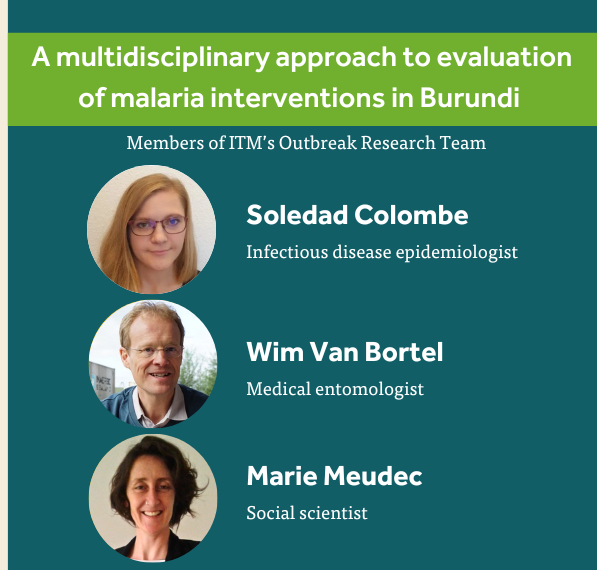A Date with Science: A multidisciplinary approach to evaluation of malaria interventions in Burundi

Join us for a special edition of ITM's 'A Date with Science': a series of academic seminars that take place every last Thursday of the month, live in Antwerp followed by a drink and online.
Programme:
3pm – 4pm: Academic seminar in aula Janssens (and online)
4pm – 5.30pm: Drink in Karibu at ITM
Speakers: Three members of ITM's Outbreak Research Team: Soledad Colombe, Wim Van Bortel and Marie Meudec
Title: A multidisciplinary approach to evaluation of malaria interventions in Burundi
Register: Please register to attend in person or to follow online
Abstract:
The Outbreak Research Team (ORT) at ITM conducts interdisciplinary applied research to enhance outbreak preparedness, response, recovery, and resilience, in both low and high income settings. Three members of the ORT will explore a compelling case study: a recent malaria outbreak in Burundi. Through this case, they will highlight the importance of comprehensive malaria control strategies and the evaluation of multidisciplinary interventions.
Malaria is the leading cause of morbidity and mortality in Burundi and the country has a history of devastating malaria epidemics in the highland areas of the country. Since 2004 the Burundian National Malaria Control Programme (PNILP) has elaborated a national control strategy. The strategy is based upon increased epidemiological surveillance, epidemiological stratification, improved case management with artemisinin-based combination therapy, strengthening health facility, mass and continuous distribution of long-lasting Insecticidal nets (LLIN), and focal indoor residual spraying (IRS), and more recently community dialogue, in areas most at risk and/or experiencing outbreaks.
In the context of the ITM/MSF-OCB scientific collaboration on malaria in Burundi, we aimed to comprehensively assess the impact of malaria interventions carried out at different points in time, for both prevention and outbreak control. Following a previous project that had assessed the impact of mass bed net distribution on malaria incidence using routine surveillance data (DHIS2), we further assessed bed net durability over a 12-month period. In addition, we measured the impact of IRS interventions in two health district using DHIS2 data. To support our analysis, we evaluated the DHIS2 surveillance system for malaria. Finally, to understand the social impact and acceptance of these interventions, we explored people’s perceptions of the various malaria control interventions.
During this seminar we will present the results of these studies and discuss the need for comprehensive malaria control strategies and multidisciplinary intervention evaluation in the context of Burundi.
Short Bio:
Soledad Colombe is an infectious disease epidemiologist with a veterinary medicine background. She has experience as an epidemiologist in the field of One Health and International Health in both academic environments and public health settings. With a strong analytical profile, she has a keen interest in interdisciplinary approaches, integrated surveillance and comprehensive intervention evaluation methods. Her current projects focus on the use of mixed quantitative/qualitative methods for outbreak-prone diseases such as malaria, scabies and Rift Valley Fever, in both high income and low income settings. Through her work, she aims to bridge the gap between research, policy, and practice to create healthier and more resilient communities.
Marie Meudec’s work focuses on deeply understanding and effectively addressing health challenges, particularly those linked to social inequities, racism, gender disparities, and the complex social dimensions of health crises. She employs a diverse range of methodologies, including qualitative research, participatory techniques, and a critical perspective on global public health issues. Recent efforts include advocating for feminist approaches in shaping global health policy, examining the implications of racism and health in public health research, and highlighting the importance of gender-sensitive strategies in outbreak responses. Additionally, she is engaged in research projects investigating various diseases and outbreaks (scabies, malaria, Rift Valley fever, Bartonella quintana infection, AMR, COVID-19) across different settings (Belgium, the DRC, Burundi, Rwanda, and Canada). Motivated by her commitment to social justice, her aim is to generate impactful research that drives concrete social change.
Wim Van Bortel is a medical entomologist, PhD, with more than 25 years of experience in research on vectors and vector-borne diseases in Europe, Africa and Asia. His research focuses on disentangling the role of arthropod vectors in transmission systems in order to improve vector-borne diseases prevention and control in a public health context. As member of the ITM outbreak Research team he aims to enhance the understanding of what drives the transmission and spread of outbreak-prone diseases, as well as to assess different outbreak prevention and control strategies. He is currently involved in research projects on malaria, arboviruses, scabies, Bartonella quintana infection, Rift Valley fever, and Leishmaniasis in different settings (Belgium, Burundi, the DRC, Morocco, Rwanda, Nepal). He is also involved in the monitoring of Aedes albopictus, the tiger mosquito, in Belgium.
Spread the word! Share this event on